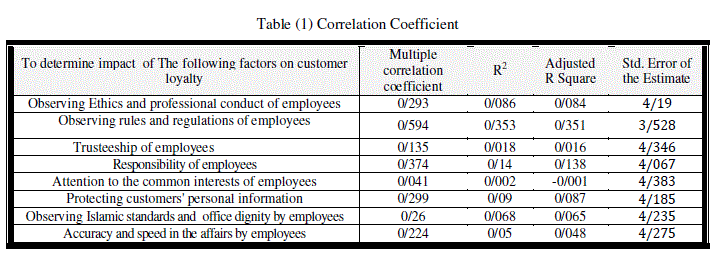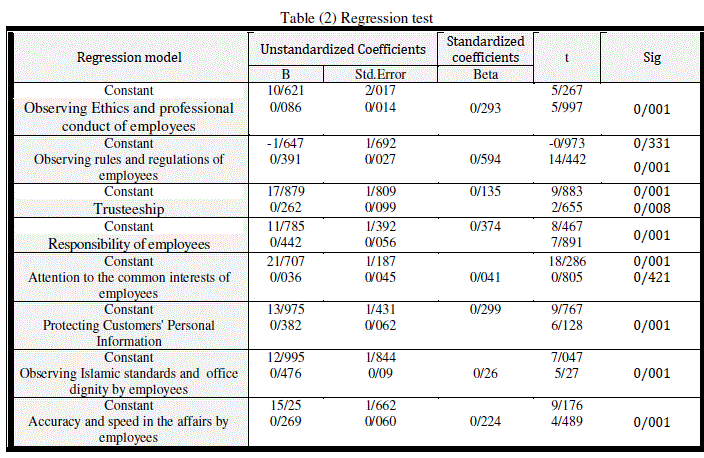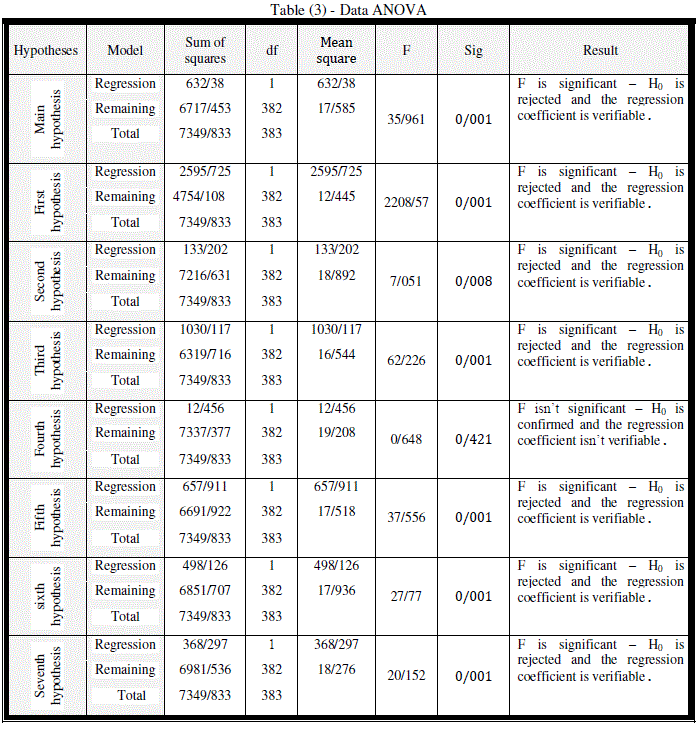ISSN ONLINE(2319-8753)PRINT(2347-6710)
ISSN ONLINE(2319-8753)PRINT(2347-6710)
Dr.Sh. Biabani1, S. Asadbeigi2
|
| Related article at Pubmed, Scholar Google |
Visit for more related articles at International Journal of Innovative Research in Science, Engineering and Technology
Financial science as a branch of the social sciences plays an invaluable role in the economic and business environment. Economic activity is not possible without relying on financial knowledge and managerial. The objective of this study is surveying the impact of ethics and professional conduct of employees on the customer loyalty. Statistical population of this study includes customers the various branches of Melli Bank in Hamedan (Iran). The questionnaire is used as instrument of data collection. Linear regression analysis was used to test the research hypotheses. Lateral purposes of research as well as is used t-test of independent groups and ANOVA to assess lateral results. Research results indicate that there is a significant relationship between ethics and professional conduct of employees on customer loyalty and the correlation between these two is high and positive
Keywords |
| Professional Conduct, Customer Loyalty, Ethics, Melli Bank |
I. INTRODUCTION |
| Although concept of customer satisfaction the first by Peter Drucker in 1954 express direct and indirect in marketing and management literature but review of resources related to customer satisfaction shows that serious studies in field began in the mid-1970s, mainly in America and in 1980 by considerable development of researches, the basics of this subject is clear. |
| The main effort in decades has been finding a comprehensive model for explaining and measuring customer satisfaction. Professional ethics is one of the main issues in all human societies. Now, unfortunately, in our society and in the workplace is less attention to professional ethics. While in the secular West, in knowledge related to management and organization exist professional ethics as a branch, but in our religious community in management don’t be enough attention to ethics [1]. |
| Our society needs to define professional ethics features such as interest to work, spirit of cooperation and trust, creating and interact with each other ... and make Culture. Nowadays most industrialized countries in the world have to believe that disregard for ethical issues and evade from social responsibility leads to the loss of business. For this reason, many successful companies have felt the need for an ethical strategy formulation and achieve to believed that every organization must exist a culture based on ethics. Thus, they tried to give a special status to research about professional ethics. When from field of individual and private move to business, the discussion of work ethic and job ethic emerge. Nowadays professional ethics has strategic role in business and strategic management experts, competent ethical principles in the organization know preconditions of good strategic management [2]. |
| However, customers of enterprise are considered one of the greatest potential that ensures maintaining its durability and sustainability. The secret of maintaining customers is in 'customer loyalty' to the economic institution. Among all economic agencies, banks are only financial and economic institutions that will accelerate their death by losing their customers or at least lag from development cycle. This research intended to review a dimension of the management science in the field of the success of bank about customer loyalty conclusions. |
II. LITERATURE REVIEW |
| 2.1. The Concept of Ethics |
| The ethics means observing moral principles and values that govern a person's behavior, stating what is true and what is false and ethical values are determinant standards based on behavior and decision making, what is good or bad [3]. Ethics can be defined as the branch of philosophy about concern from the human behavior about the right and wrong of actions, good and evil, faith and the consequences of such actions [4]. Dating of ethics goes back to 2,500 years ago. For example, at the time of Socrates, Plato and Aristotle are presented behavioral theories for a set of principles of human behavior. For example Egoism Theory (Selfishness) stated that behavior and human practice when it would be desirable which consider the long-term interests of the individual. Utilitarian theory suggests, individual efforts should be in a direction which its benefits more than disadvantage it [5]. Socrates was the first who established a rationale for ethically and correct behavior and he know theory of ethics based on the knowledge [6]. Ethics in Islam emphasized and one of the main goals of Prophets in the Quran was ethics, because advancement and prosperity of human depends on adherence and adornment to divine ethics [7]. |
| 2.2. The Concept of Professional Ethics |
| First, the concept of professional ethics was used in means work ethic and ethic in jobs. Today, some of the authors are used the first meaning of the concepts to define it [8]. |
| Various definitions of professional ethics are presented: |
| A) Professional ethics is one of the new branches of ethics which attempts to respond to ethical issues of various professions and as well as expected certain principles for it [9]. |
| b) Professional ethics explored ethical issues and questions and ethical values and principles and it is monitoring ethics in professional environment [10]. |
| c) Personal ethics is responsibility toward own personal behavior, merely conceived as a human person, and the work ethic. It is an individual responsibility toward professional conduct and his career as a business owner or organizational position [11]. |
| D) Professional ethics is a branch of morality knowledge that deals with the study of moral obligations in professional and ethical issues and in definition of the professional; it is a certain activity that led to individual guidance to determined special status along with special ethics [12]. |
| Also in definition of professional ethics is mentioned following items: |
| 1. Professional ethics, behavior is common among the people of a professional. |
| 2. Professional ethics is management and human behavior when doing professional work. |
| 3. Professional ethics is discipline of ethical knowledge that deals with the study of employment relations. |
| 4. Professional ethics is consists of a set of rules that at first glance obtain the nature of the profession [13]. |
| As is considered, there are two characteristics of professional ethics in most definitions: |
| A) Existence attitude of individualism, |
| b) Limitation of responsibilities and ethical obligations in the job. |
| It seems that this view of professional ethics is delivery approach and reducing professional ethics; because in careers institutions of collective identity and organizational in business is so many beyond the individual job of people. According to this view, nowadays raised the discussion of professional ethics in managerial resource and in the literature and issues related to human resource management [14]. |
III. RESEARCH HYPOTHESES |
| 3.1. Main Hypothesis |
| Observing ethics and professional conduct of employees has impact on customer loyalty. |
| 3.2. Sub-hypothesis |
| 1- Observing rules and regulations of employees has impact on customer loyalty. |
| 2- Trusteeship of employees has impact on customer loyalty. |
| 3- Responsibility of employees has impact on customer loyalty. |
| 4- Attention to the common interests of employees has impact on customer loyalty. |
| 5- Protecting customers' personal information has impact on customer loyalty. |
| 6- Observing Islamic standards and office dignity by employees has impact on customer loyalty. |
| 7- Accuracy and speed in the affairs by employees has impact on customer loyalty. |
IV. RESEARCH METHODOLOGY |
| This research in term of time is cross sectional, according to purpose is applied, how to obtain the required data is descriptive (non-test) and a bunch of survey and in terms of the nature is the correlation. Statistical population of this study includes customers the various branches of Melli Bank in Hamedan (Iran) that based on the information and statistics of 26 bank branches have already been active in Hamadan. All the 26 branches are equipped with electronic systems include ATM, flash cards, credit cards, mobile banking, SMS banking, telephone banking, internet banking, Satna, point of sale and .... The sample size for this study was estimated by using Cochran formula. The sample size is determined 384. For sampling is used method of quota - simple random. Thus 400 questionnaires are distributed among customers. The questionnaire is used as instrument of data collection. Linear regression analysis was used to test the research hypotheses. Lateral purposes of Research as well as is used t-test of independent groups and ANOVA to assess lateral results. |
V. DATA ANALYSIS |
| Research results indicate that there is a significant relationship between ethics and professional conduct of employees on customer loyalty and the correlation between these two is high and positive. The research findings are presented in |
| Tables 1, 2 and 3. |
 |
| The results show that: 9% of the changes of customer loyalty in statistical sample of research were related to observing ethics and professional conduct of employees. In other words 9% of the changes of dependent variable can be explained by the independent variables. |
| 35/3% of the changes of customer loyalty in statistical sample of research were related to observing rules and regulations of employees. In other words 35/3% of the changes of dependent variable can be explained by the independent variables. |
| 2% of the changes of customer loyalty in statistical sample of research were related to trusteeship in Melli bank. In other words 2% of the changes of dependent variable can be explained by the independent variables. |
| 14% of the changes of customer loyalty in statistical sample of research were related to responsibility of employees in Melli bank. In other words 14% of the changes of dependent variable can be explained by the independent variables. |
| 0/2% of the changes of customer loyalty in statistical sample of research were related to attention to the common interests of employees in Melli bank. In other words 0/2 % of the changes of dependent variable can be explained by the independent variables. |
| 9% of the changes of customer loyalty in statistical sample of research were related to protecting customers' personal information in Melli bank. In other words 9% of the changes of dependent variable can be explained by the independent variables. |
| 7% of the changes of customer loyalty in statistical sample of research were related to observing Islamic standards and office dignity by employees in Melli bank. In other words 7% of the changes of dependent variable can be explained by the independent variables. |
| 5% of the changes of customer loyalty in statistical sample of research were related to accuracy and speed in the affairs by employees in Melli bank. In other words 5% of the changes of dependent variable can be explained by the independent variables. |
 |
| Table 2 shows the final results of the regression and according to this table can be write equation of the regression line: 1- Customer loyalty = 10/621+ 0/086(observing ethics and professional conduct) |
| Variable of observing ethics and professional conduct has impact on customer loyalty. It means that for each one unit increase in observing ethics and professional conduct, customer loyalty is increased 29% by Bank. Thus it can say: “Observing ethics and professional conduct has impact on customer loyalty” |
| 2- Customer loyalty = - 1/647+ 0/391(Observing rules and regulations of employees) |
| Variable of observing rules and regulations of employees has impact on customer loyalty. It means that for each one unit increase in observing rules and regulations of employees, customer loyalty is increased 59% by Bank. Thus it can say: |
| “Observing rules and regulations of employees has impact on customer loyalty” |
| 3- Customer loyalty = 17/879+ 0/262(Trusteeship) |
| Variable of trusteeship has impact on customer loyalty. It means that for each one unit increase in trusteeship, customer loyalty is increased 14% by Bank. Thus it can say: |
| “Trusteeship has impact on customer loyalty” |
| 4- Customer loyalty = 11/785+ 0/442(Responsibility of employees) |
| Variable of responsibility of employees has impact on customer loyalty. It means that for each one unit increase in responsibility of employees, customer loyalty is increased 37% by Bank. Thus it can say: “Responsibility of employees has impact on customer loyalty” |
| 5- Customer loyalty = 21/707+ 0/036 (Attention to the common interests of employees) |
| Variable of attention to the common interests doesn’t have impact on customer loyalty and this impact is not predictable. Thus it can say: |
| “Attention to the common interests of employees doesn’t have impact on customer loyalty” |
| 6- Customer loyalty = 1/431+ 0/062 (Protecting Customers' Personal Information) Variable of protecting customers' personal information has impact on customer loyalty. It means that for each one unit increase in protecting customers' personal information, customer loyalty is increased 30% by Bank. Thus it can say: “Protecting customers' personal information has impact on customer loyalty” |
| 7- Customer loyalty = 12/995+ 0/476 (Observing Islamic standards and office dignity by employees) Variable of observing Islamic standards and office dignity by employees has impact on customer loyalty. It means that for each one unit increase in observing Islamic standards and office dignity by employees, customer loyalty is increased 26% by Bank. Thus it can say: “Observing Islamic standards and office dignity by employees has impact on customer loyalty” |
| 8- Customer loyalty = 15/25+ 0/269 (Accuracy and speed in the affairs by employees) Variable of accuracy and speed in the affairs by employees has impact on customer loyalty. It means that for each one unit increase in accuracy and speed in the affairs by employees, customer loyalty is increased 22% by Bank. Thus it can say: |
| “Accuracy and speed in the affairs by employees has impact on customer loyalty” |
 |
VI. CONCLUSION |
| In this study was attempted to assess the correlation between the seven dimensions from professional ethics of employees on customer loyalty in Melli Bank by using a questionnaire and statistical tests. The results showed that variable of observing ethics and professional conduct of employees has adequate powers on is customer loyalty in Melli bank and this impact is predictable; It means that for each one unit increase in observing ethics and professional conduct, customer loyalty is increased 29%. Findings from research showed that six dimension of the seven dimensions of professional ethics: observing rules and regulations, trusteeship, responsibility, protecting customers' personal, observing Islamic standards, accuracy and speed in the affairs can maintain customer and only variable of attention to the common interests of employees doesn’t effect on the dependent variable. Thus it can say that “Observing ethics and professional conduct of employees has impact on customer loyalty”. |
References |
|